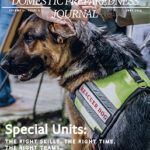Full article by Ashley Bradley and Kristin Omberg, an Article Out Loud from Domestic Preparedness, June 12, 2024.
In this feature article, a biomedical scientist and a senior technical advisor share new ways scientists at Pacific Northwest National Laboratory are expanding detection strategies and technologies to keep responders safe. The deadly opioid epidemic in the United States does not stop at overdoses.
Listen to expert insights on what is being done to reduce life-threatening on-scene exposures to first responders.

Ashley Bradley
Ashley Bradley is a biomedical scientist with a background in analytical chemistry and molecular biology. She graduated from Washington State University magna cum laude with a BS in biochemistry and a double major in genetics. Since joining the Pacific Northwest National Laboratory (PNNL) in 2017, her work has focused on spectroscopic signatures of solid, liquid, and gas-phase samples. Most notably, she has been a key contributor to the liquid signatures effort, playing a major role in collecting important data used in high-fidelity spectral libraries. She is currently a principal investigator for a project that utilizes this capability to expand spectral libraries of instruments used by first responders.
- Ashley Bradleyhttps://domesticpreparedness.com/author/ashley-bradley

Kristin Omberg
Kristin Omberg is a senior technical advisor in the National Security Directorate at PNNL. Her technical work focuses on developing science and technology solutions that can be deployed in operational environments or used to inform policy decisions. Before joining PNNL, she spent more than 15 years at Los Alamos National Laboratory, where she was a program manager and principal investigator for numerous projects for the DHS and Defense.
- Kristin Omberghttps://domesticpreparedness.com/author/kristin-omberg








